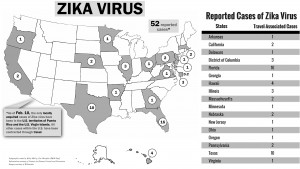
(Made by Kelly McCoy)
A Lehigh student who traveled abroad over winter break and tested positive for Zika virus has recovered, according to an email on Feb. 10 from John Smeaton, vice provost of Student Affairs.
Zika virus is transmitted through infected Aedes mosquitos, and symptoms include a rash, fever, joint pain or conjunctivitis, according to the Center for Disease Control and Prevention. Fifty-two cases have been reported in the United States, two of which were in Pennsylvania. All of the reported cases were acquired in areas where the mosquitoes carry the virus, and none of those mosquitoes are in the United States.
Susan Kitei, director of the Health and Wellness Center, said the Lehigh community was notified as soon as the case was confirmed by the Pennsylvania Department of Health. When the Health Center was notified of the possibility of a student with the virus, tests were run immediately to determine if the student posed a threat to the Lehigh community.
“The test that definitively diagnoses the Zika virus is a blood test, which currently is only run by the CDC lab in Atlanta,” Kitei wrote in an email. “It takes at least two weeks to get the test results. The Health and Wellness Center received notification from the State Department of Health on Feb. 10 that our student tested positive, and an email went out to the campus the same day.”
The circumstances surrounding an event when a student contracts a virus determine when and if the campus community is notified. Smeaton wrote that the student who obtained the virus did not pose any risk to others and that it is also important to confirm a case before the community is notified. Kitei wrote that the campus was notified about the case as soon as it was confirmed because of the media coverage of the Zika virus.
“In the case of Zika, the campus was notified immediately because of the coverage Zika is receiving in the media, even though there was essentially no risk to the campus,” Kitei said. “The Health and Wellness Center follows HIPAA patient privacy laws, meaning that confidentiality can only be broken in the case of a public health risk.”
According to Smeaton, several avenues would be used to notify students and the community if a potential risk arises.
“We would use the LU-ALERT system, social media, web postings, email, local media as well as personal outreach via professional and student staff to provide timely, accurate information including the facts of the situation, instructions about what to do if one has been exposed and how best to prevent exposure,” Smeaton wrote.
Smeaton wrote that this extent of notification was not needed, but the general information was carried out as a courtesy to the Lehigh community.
The Center for Disease Control follows the same protocol in notifying a campus of a spreading virus that can possibly affect the community as a whole. Urgent notification also depends on the extent of how detrimental the virus is, if it is at all, Smeaton said.
The Center for Disease Control website notes the measures they are taking with regards to the virus are a precaution to the community.
“The arrival of Zika in the Americas demonstrates the risks posed by this and other exotic viruses,” according to the website. “CDC’s health security plans are designed to effectively monitor for disease, equip diagnostic laboratories and support mosquito control programs both in the United States and around the world.”





Comment policy
Comments posted to The Brown and White website are reviewed by a moderator before being approved. Incendiary speech or harassing language, including comments targeted at individuals, may be deemed unacceptable and not published. Spam and other soliciting will also be declined.
The Brown and White also reserves the right to not publish entirely anonymous comments.